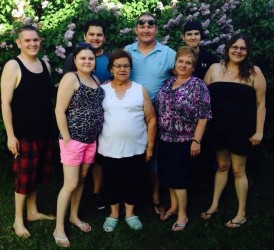Article Origin
Volume
Issue
Year
March 31, 2016.
Joanne McDonald knows both personally and professionally the impact diabetes can have on a person’s life.
McDonald is a member of the Enoch Cree Nation and serves as community health representative at the local health centre. She’s also the mother of three children with type 2 diabetes and married to a diabetic.
Joanne McDonald with her family: husband David and three children all have diabetes. She says a new clinic operating on the Enoch Cree Nation has made a difference.
(Photo: supplied)
There’s a lot of shame that comes along with being diabetic, she says. People, not wanting to advertise their condition, eat and drink and behave as if they have no health concerns.
“We tell people not to be ashamed of having diabetes. It’s there and unfortunately we have a lot in the Aboriginal community. It goes back generations,” said McDonald, who points to her husband’s family. David lost his father recently, as well as many of his aunts and uncles, to diabetes or complications due to diabetes. “(At the health centre) we’re very open with (people) and talk about it and let them know they’re not alone.”
McDonald is finding that that message is starting to hit home - along with the message that is being delivered by physician Dr. Jeff Winterstein.
“It’s his whole approach in general. He doesn’t beat around the bush,” said McDonald. “He tells people, ‘You control the disease, so don’t let the disease control you.’”
McDonald says knowing that diabetes ran high on the Enoch Cree Nation and that family physicians were not equipped to fully deal with the disease, Winterstein, a diabetic specialist was approached. Winterstein began making the trip to the Enoch Cree Nation from Edmonton two years ago. He holds a monthly clinic on the First Nation, where he meets with approximately 25 patients each visit, some getting treatment for diabetes for the first time, others having difficulty with controlling their diabetes.
McDonald says Winterstein has a good rapport with the clients and also works well with the family physicians.
Winterstein says his first clinics consisted of 10 scheduled appointments and only three patients coming out. Now, he regularly has 20 scheduled patients and a handful more dropping in.
That’s one way he rates the success of his clinics. He also looks at the above and below the knee amputations. Two years ago, he says, the amputations, caused by untreated diabetes, were unusually high for the population size. There have been no surgeries since the clinic opened.
Diabetic comas, blood sugar levels and trips to the hospital have all decreased since the clinic started operating.
Along with his tell-it-as-it-is attitude, Winterstein also attributes trust and commitment to the successful fight against diabetes on the Enoch Cree Nation.
First Nations populations, he says, have difficulty trusting the medical system.
“A lot of times, it’s just sitting and listening,” said Winterstein. “I don’t guarantee we’re going to get you better, but I do guarantee I will be here for problems that arise from it.”
Winterstein also attributes the success of the clinic to diabetes coordinator Sue McGillis, who worked extra hard when the clinic was established to put a system in place and follow up on lab tests and ultrasound results. He also commends the local pharmaceutical representative Lise Watts, who provides food for the monthly clinic.
McDonald looks at her own family when she talks about changes that need to be made in lifestyle. Her daughters Merranda (32) and Natasha (30) are diabetic, with Natasha diagnosed with pancreatitis at 15 years of age. Son Zachery, 23, was diagnosed with diabetes at 12 or 13 years of age and had a hard time in junior high school with the disease. Husband David was diagnosed in his mid-20s and was in “complete denial” until he had a heart attack at 38 years of age. When her family gets together now for meals they drink water instead of diet pop, and “do random blood sugar tests to see where everybody is at.”
Professionally, McDonald works with prevention, promotion and teaching of healthy lifestyles. She also teaches prenatal and environmental health.
Diet, exercise, cutting back on smoking, and medication are all integral in combatting diabetes, which Winterstein says “shows everywhere. It’s a multi-systemic disease.”
Winterstein says he is hoping to have a dietitian at the clinic in May. McDonald says the health centre is also working to get a counsellor as uncontrolled diabetes often leads to depression.
While Enoch Cree Nation is the only First Nation that Winterstein physically visits, he runs a diabetes telehealth service in High Level and is working to establish a telehealth service in Slave Lake.
“Other communities have heard about the relative success we’ve had and are going to try and emulate that,” Winterstein said.
Winterstein refers to Enoch Cree Nation as the “perfect storm:” supportive infrastructure and a community approach that breeds trust and commitment. He is hopeful those attitudes will exist on other First Nations, which will lead to success in treating diabetes.
- 3016 views

